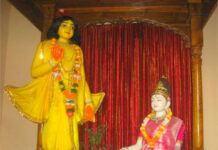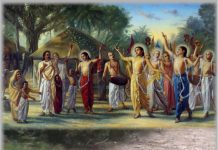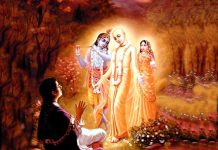
Continued from previous page… Above the madhyama-adhikari is the uttama-adhikari, who sees everything in relation to the Supreme Lord. Such a devotee does not discriminate between an atheist and a theist but sees everyone as part and parcel of God. He knows that there is no essential difference between a vastly learned brahmana and a dog in the street, because both of them are part and parcel of the Lord, although they are encaged in different bodies on account of the different qualities of their activities in their previous lives. He sees that the brahmana particle of the Supreme Lord has not misused his little independence given him by the Lord and that the dog particle has misused his independence and is therefore being punished by the laws of nature by being encaged in the form of a dog. Not considering the respective actions of the brahmana and the dog, the uttama-adhikari tries to do good to both. Such a learned devotee is not misled by material bodies but is attracted by the spiritual spark within them.
Those who imitate an uttama-adhikari by flaunting a sense of oneness or fellowship but who behave on the bodily platform are actually false philanthropists. The conception of universal brotherhood must be learned from an uttama-adhikari and not from a foolish person who does not properly understand the individual soul or the Supreme Lord’s Supersoul expansion, who dwells everywhere.
It is clearly mentioned in this sixth mantra that one should “observe,” or systematically see. This means that one must follow the previous acharyas, the perfected teachers. Anupasyati is the exact Sanskrit word used in this connection. Anu means “to follow,” and pasyati means “to observe.” Thus the word anupasyati means that one should not see things as he does with the naked eye but should follow the previous acaryas. Due to material defects, the naked eye cannot see anything properly. One cannot see properly unless one has heard from a superior source, and the highest source is the Vedic wisdom, which is spoken by the Lord Himself. Vedic truths are coming in disciplic succession from the Lord to Brahma, from Brahma to Narada, from Narada to Vyasa, and from Vyasa to many of his disciples. Formerly there was no need to record the messages of the Vedas, because people in earlier ages were more intelligent and had sharper memories. They could follow the instructions simply by hearing once from the mouth of a bona fide spiritual master.
At present there are many commentaries on the revealed scriptures, but most of them are not in the line of disciplic succession coming from Srila Vyasadeva, who originally compiled the Vedic wisdom. The final, most perfect and sublime work by Srila Vyasadeva is Srimad-Bhagavatam, which is the natural commentary on the Vedanta-sutra. There is also the Bhagavad-gita, which was spoken by the Lord Himself and recorded by Vyasadeva. These are the most important revealed scriptures, and any commentary that contradicts the principles of the Bhagavad-gita or Srimad-Bhagavatam is unauthorized. There is complete agreement among the Upanishads, Vedanta-sutra, Vedas, Bhagavad-gita and Srimad-Bhagavatam, and no one should try to reach any conclusion about the Vedas without receiving instructions from members of Vyasadeva’s disciplic succession, who believe in the Personality of Godhead and His diverse energies as they are explained in Sri Isopanishad.
According to the Bhagavad-gita (18.54), only one who is already on the liberated platform (brahma-bhuta [SB 4.30.20]) can become an uttama-adhikari devotee and see every living being as his own brother. This vision cannot be had by politicians, who are always after some material gain. One who imitates the symptoms of an uttama-adhikari may serve another’s outward body for the purpose of fame or material reward, but he does not serve the spirit soul.
Such an imitator can have no information of the spiritual world. The uttama-adhikari sees the spirit soul within the material body and serves him as spirit. Thus the material aspect is automatically served.
(To continue read the next page…)
Source: Sri Isopanishad. Translation and purports by His Divine Grace A.C.Bhaktivedanta Swami Prabhupada. Copyright BBT International http://www.vedabase.com/en/iso

























